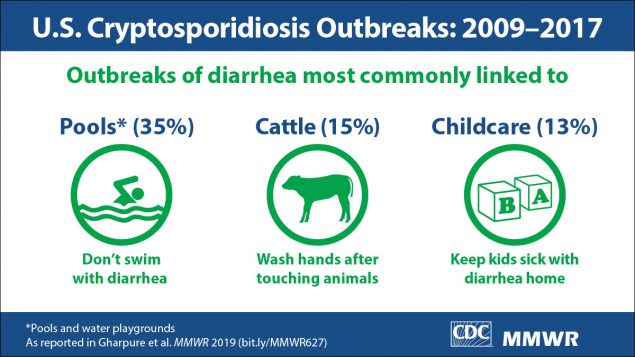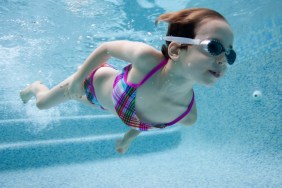Every year there are stories of weird and icky things to be wary of in public pools and the prevailing thought is, ‘meh, the chlorine will kill it.’ But it turns out that that’s simply not true. No matter what chemicals are dumped in a swimming pool, there are disgusting organisms that can survive and make you sick.
The CDC released a report on June 28th that paints a shocking picture of a nasty parasite that can make people sick. The crazy part, though? This particular bug (crypto parasite) can live in pools – yup, that same pool doused in chemicals to keep it clean – for up to three days.
So, what is this parasite, exactly? According to the CDC, “Cryptosporidium is a parasite that causes cryptosporidiosis, profuse, watery diarrhea that can last up to 3 weeks in immunocompetent patients and can lead to life-threatening malnutrition and wasting in immunocompromised patients.”

The report details that the ways in which people are generally infected are via fecal-oral transmission. So, basically, if you swallow pool water that has poop particles, you’re probably going to get the runs. But not just any runs, this version of diarrhea is reported to last up to three weeks and can become life-threatening requiring serious medical intervention.
How to Keep Your Little Swimmers Healthy, Despite All the Pee in the Pool
The CDC reports that between 2009 and 2017, there were an estimated 7,465 cases of cryptosporidiosis and of those, 4,232 were from public pools.
So, what’s up with chlorine, does it kill germs or not? The CDC says that chlorine will kill most but not all germs but it’s not an instant fix and it requires constant monitoring. When chlorine is added to pool water, it alters the pH of the water thus making it insufferable to germs and then they die.
The CDC recommends that pools get a pH 7.2 – 7.8 and at least 1 ppm but for 3 ppm for hot tubs and spas. If that pH balance isn’t maintained then germs can swim around as freely as your kids. It’s important to note that not all germs will die even if you get the pH balance just right.
To prevent the outbreaks, the CDC recommends that children and adults who have diarrhea not swim in public pools until all symptoms are gone. To prevent diarrhea, people are urged to wash their hands with warm water and soap after using the bathroom, touching animals including barnyard animals and pets, and after eating food or touching trash.
Easy DIY Pool NoodleChair Float (Made With Materials from the Dollar Store)
Since there is no real way to know if a pool has the parasite it is really up to the parents to assess the risks and make a choice about whether or not to swim in a public pool.
I don’t know about you, but that garden hose is looking pretty good right now.








